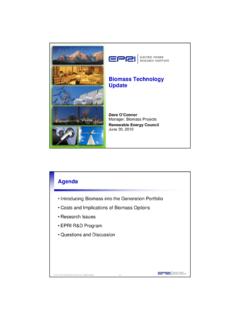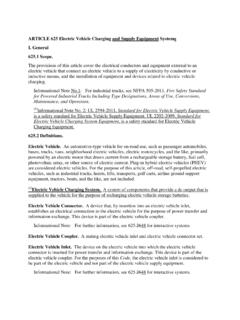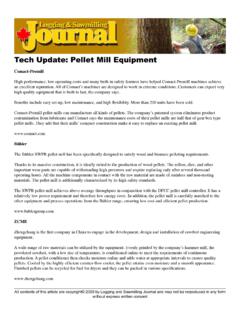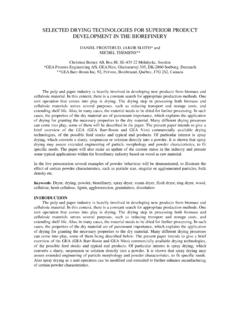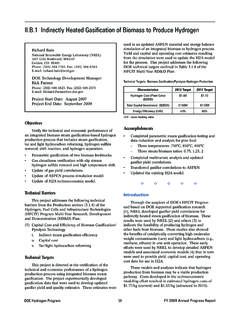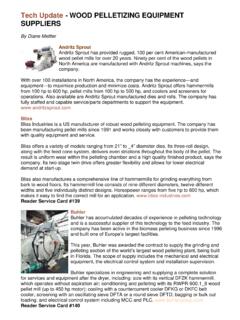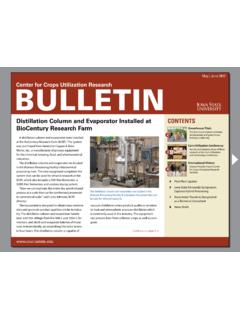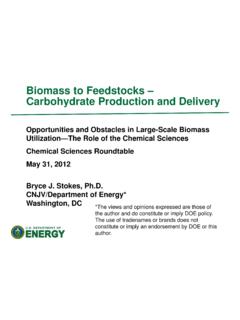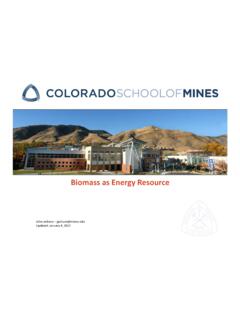Transcription of Biomass - Program 188 - EPRI
1 P. 1 Biomass - Program 188 Program Overview Program Description Power produced from Biomass offers a renewable, low-carbon-emitting option for dispatchable energy. Additionally, biopower can provide local economic support, coproduct opportunities, and environmental benefits, including restoration. Despite the abundant benefits of Biomass -based power, overall development has been somewhat hindered by two critical issues: developing a reliable, sustainable supply chain, and producing cost-effective power with high efficiency. These two issues are the fulcrum of EPRI s research Program , providing context to a set of very complicated, interrelated issues. Participation in this Program also includes results of Biomass engineering and economic evaluations as described under the Renewable Energy Economics and technology Status Program ( Program 84).
2 Research Value EPRI s Biomass research Program provides ongoing insight into the technical feasibility of Biomass power options, details the costs of those options, and informs the public debate on environmental matters, especially the carbon footprint of Biomass power. Collaboration in the Biomass Program provides value to those organizations that are Developing Biomass power options and are interested in optimizing those assets over the long term; Contemplating biopower scenarios and need evaluation tools, engineering results, and cost information; Monitoring biopower developments, comparing generation costs to costs of other renewables, and examining the societal role of biopower; and In the Biomass supply business as the biopower sector pushes toward lower costs and more-robust, sustainable supply chains. Approach Through a comprehensive stakeholder roadmapping process, critical issues facing the Biomass industry were identified.
3 As noted above, this process has highlighted two critical issues: building a reliable, sustainable supply chain, and providing technology to reliably and cost-effectively convert the Biomass to power. The roadmapping provides a deeper look at the details of addressing these drivers, and EPRI turns to the funders to prioritize the annual activities. In many cases, it is advantageous to engage non power-producers in crafting the R&D solution. Collaboration with organizations such as universities, timber companies, government agencies, and national laboratories is invaluable to Biomass R&D. Accomplishments The EPRI Biomass effort has pioneered work in cofiring with Biomass , repowering coal units with Biomass , and upgrading of Biomass feedstocks. Information developed by EPRI has informed the public debate on the life-cycle greenhouse gas impacts of Biomass power.
4 Additionally, EPRI s ongoing efforts to qualify and estimate the cost of technical developments provide a reliable industry tool for understanding the role of biopower in the portfolio of generation options. In 2012, EPRI is providing three key R&D results. First, EPRI will host a workshop that addresses the critical issues power producers face in dealing with the carbon footprint of biopower. This workshop will include life-cycle assessments as well as presentation of tools for managing and understanding carbon neutrality issues. Second, an assessment of high-fraction cofiring will be delivered, including an update on direct injection systems and use of upgraded Biomass . Finally, while there are abundant cost estimates for the nonfuel components of Biomass power, they are wildly divergent. Reconciling this diverse set of capital expenditure figures will allow a truer, more reliable picture of biopower costs for both stand-alone power and cofiring to emerge.
5 Additionally, a year-end summary is provided to funders and to the public in the form of the annual Biomass -to-Electricity Workshop, hosted in 2012 by the Tennessee Valley Authority. Electric Power Research Institute 2013 Research Portfolio Biomass - Program 188 p. 2 Current Year Activities The 2013 Program will continue work on major industry issues, including sustainability standards, creation of robust supply chains, and communication of sustainability/neutrality work to stakeholders and policymakers. The key technologies required to improve the economics of Biomass power, including repowering options and high-fraction cofiring systems, will be evaluated and developed. Additionally, high-efficiency systems such as combined heat and power plants and gasification power plants will undergo further development. Finally, investigations will provide insight into the practicality of upgraded Biomass fuels and the broad deployment of waste-to-energy facilities.
6 Estimated 2013 Program Funding Program Manager David O'Connor, 650-855-8970, Summary of Projects Project Number Project Title Description Biomass Supply Management This project provides analyses of critical Biomass supply issues to develop vigorous, durable fuel delivery for power stations. Power Generation from Biomass This project develops information and technologies that can allow utilities to cost-effectively adopt Biomass power within their generation and renewable energy portfolios. Biomass Environmental Issues This project will evaluate various environmental factors with respect to their regional sensitivity and overall importance to a Biomass operation. Biomass Supply Management (069181) Key Research Question The increasing number of renewable portfolio standards will drive many organizations to deploy Biomass -to-electricity plants.
7 In the late 1980s in California, the demand for Biomass supply for power stations outstripped production. The result was a significant industry restructuring, including ownership changes and plant shutdowns. Today, as the electricity sector moves into Biomass -to-power, lessons such as this will be important for understanding the ever-evolving Biomass fuel supply situation. Similarly, as more Biomass enters the electric sector, there will internal and external pressure on utilities to ensure that supplies of Biomass will last the life of the plant and beyond. A more complete understanding of the existing and future Biomass supply market is necessary to make informed fuel procurement and investment decisions. Utilities have vast experience in procuring coal and natural gas, and have developed considerable understanding of the key aspects of those fuels.
8 However, procuring Biomass in large, dependable supplies places utilities in unfamiliar territory, potentially dealing with a whole array of new issues, including Large numbers of smaller suppliers, rather than a few large suppliers; Sharply defined supply seasonality; New, unproven supply chains and infrastructure developments, including the potential for aggregation and fuel upgrading; Electric Power Research Institute 2013 Research Portfolio Biomass - Program 188 p. 3 Uncertain future resource availability due to competition from other Biomass consumers and critical water/land use priorities; and Poor understanding of Biomass markets, including cost structure and price risk mitigation options. Perhaps most importantly, for Biomass to be considered renewable by the public, the supply must be sustainable and have a minimal carbon footprint.
9 The Environmental Protection Agency (EPA) is currently evaluating its position that Biomass is carbon neutral while additional information is developed and relayed to the Agency. This window of opportunity will allow EPRI and others to provide critical information for the debate on neutrality. Because owners need to operate their Biomass facilities for decades to make sound financial decisions, a sustainable, long-term supply is a paramount consideration. Considerable work remains on determining sustainability of various supplies. Approach This project will gather information from existing sources and industries, such as the forestry and agriculture industries. Lessons will be collected from the infrastructure development of industries such as pulp and paper and food products, and existing research will be mined for insights into land use. Best practices in procurement from other bio-based industries will be surveyed.
10 Because the utility sector's needs are somewhat different from those of existing bio-products sectors, many of the practices and analyses will need to be adapted for deployment in the utility business framework. More-specific modeling will be undertaken to clarify Biomass fuel procurement risk and risk management strategies. Impact The results of this work can be used to Build a robust fuel supply chain; Understand and communicate the important issues of sustainability and carbon neutrality; Manage supply and price risk; Understand competing uses for land, water, and Biomass ; Develop improved contracting methods; and Understand investment risk. How to Apply Results Members can use the results of this project to gain a deeper understanding of Biomass markets from lessons learned from other industries and implications of land-use modeling.
